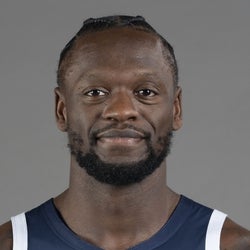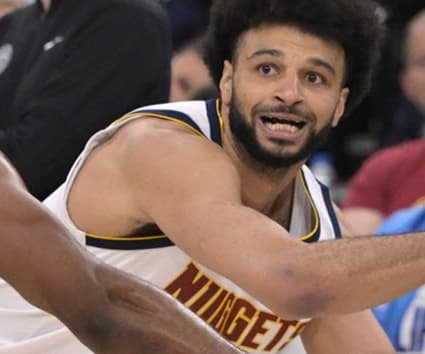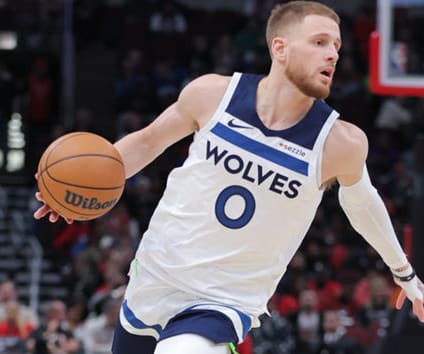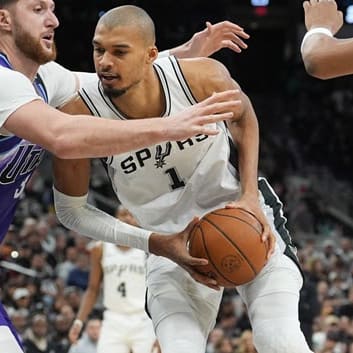2025 Stats
PTS
22.6
REB
7.0
AST
5.4
STL
1.1
BLK
0.2
ROS Projections
2025 Fantasy Outlook
After five seasons with the Knicks, Randle was dealt to the Timberwolves before the start of last season. His offensive production decreased alongside Anthony Edwards, as did his rebounding alongside Rudy Gobert, posting averages of 18.7 points, 7.1 rebounds and 4.7 assists in 32.3 minutes. However, managers in category leagues could be pleased with increased shooting percentages, not to mention fewer turnovers. Randle's role projects to be the same in 2025-26. He'll function as Minnesota's No. 2 offensive option, but one who may see his minutes occasionally limited if Naz Reid is running hot. Randle is a solid option for most fantasy managers in the mid-to-late rounds as a player with a high floor given his role and relatively good health across his career. Read Past Outlooks

Struggles with shot Sunday
Randle finished with 11 points (3-11 FG, 0-4 3Pt, 5-6 FT), five rebounds, six assists, one block and three steals over 35 minutes during Sunday's 111-85 loss to the Warriors.
ANALYSIS
While the veteran forward contributed in other categories, the 11 points represented Randle's lowest output since he was held to a season-low 10 by the Thunder on Nov. 26. He's putting the finishing touches on a January that has seen Randle average 22.3 points, 6.9 boards, 4.4 assists, 1.5 threes and 1.1 steals over 12 games.
While the veteran forward contributed in other categories, the 11 points represented Randle's lowest output since he was held to a season-low 10 by the Thunder on Nov. 26. He's putting the finishing touches on a January that has seen Randle average 22.3 points, 6.9 boards, 4.4 assists, 1.5 threes and 1.1 steals over 12 games.
NBA Per Game Stats
Per Game
Total
Per 36
NBA Per Game Stats
Loading Per Game Stats...
2025 NBA Game Log
2025
2024
2023
2022
2021
2020
2019
2018
2017
2016
2025 NBA Per Game Split Stats
Schedule
By Month
Starting/Off Bench
Days Rest
Vs Opp
By Result
2025 NBA Per Game Split Stats
Loading Split Stats...
Advanced Stats
Loading Advanced Stats...
Stat Review
2025
2024
2023
2022
2021
2020
2019
2018
2017
2016
How does Julius Randle compare to other players?
This section compares his stats with all players from the previous three seasons (minimum 200 minutes played)*. The bar represents the player's percentile rank. For example, if the bar is halfway across, then the player falls into the 50th percentile for that stat and it would be considered average.
True Shooting %
60.3%
Effective Field Goal %
54.4%
3-Point Attempt Rate
29.8%
Free Throw Rate
41.8%
Offensive Rebound %
5.5%
Defensive Rebound %
17.2%
Total Rebound %
11.5%
Assist %
24.5%
Steal %
1.4%
Block %
0.5%
Turnover %
9.6%
Usage %
26.7%
Fantasy Points Per Game
40.4
Fantasy Points Per Minute
1.2
NBA Historical Fantasy Stats
Historical ADP
Loading Historical ADP...
Timberwolves Depth Chart
Our full team depth charts are reserved for RotoWire subscribers.
Subscribe Now
Timberwolves Rotation: Minutes Breakdown
Loading Timberwolves Rotation Data...
Average Fantasy Points
Minutes
FanDuel
DraftKings
Yahoo
FantasyDraft
Head2Head
Sorare
Average Fantasy Points are determined when Julius Randle was active vs. non-active during the season. Click here to view average fantasy points for a different time period.
Loading Average Minutes...
Past Fantasy Outlooks
2024
2023
2022
2021
2020
2019
2018
2017
2016
2015
2014
In 2023-24, Randle made 46 regular-season appearances before dislocating his right shoulder in the fourth quarter of a double-digit win over the Heat on January 27. He initially tried to avoid surgery and return for the Knicks' playoff run but was ultimately shut down in early April. New York was one of the most active teams this offseason, adding Mikal Bridges, re-signing OG Anunoby, parting ways with Isaiah Hartenstein and trading Randle and Donte DiVincenzo to the Timberwolves. Randle remains in a build-up process ahead of training camp with his new squad, and it's unclear what his role will be in Minnesota. Anthony Edwards is the undisputed go-to guy, Mike Conley is an old-school point guard and Rudy Gobert protects the paint, leaving Jaden McDaniels and DiVincenzo to split time on the wings. When healthy, Randle can be one of the best one-on-one players in the NBA. However, he may not see as much usage as he's used to, especially if the Timberwolves give Naz Reid a larger role in Towns' absence.
More Fantasy News

Warriors matchup postponed
Saturday's game between the Warriors and the Timberwolves has been postponed by the NBA, Shams Charania of ESPN reports.
ANALYSIS
Subscribe now to instantly reveal our take on this news.
Subscribe now to instantly reveal our take on this news.

Tallies 30 points in loss
Randle produced 30 points (10-17 FG, 3-5 3Pt, 7-7 FT), seven rebounds and six assists in 31 minutes during Thursday's 120-115 loss to the Bulls.
ANALYSIS
Subscribe now to instantly reveal our take on this news.
Subscribe now to instantly reveal our take on this news.

Available to play
Randle (foot) is available for Thursday's game versus the Bulls.
ANALYSIS
Subscribe now to instantly reveal our take on this news.
Subscribe now to instantly reveal our take on this news.

Added to injury report
Randle is questionable for Thursday's game against the Bulls with left foot soreness.
ANALYSIS
Subscribe now to instantly reveal our take on this news.
Subscribe now to instantly reveal our take on this news.

Continues to pile up points
Randle accumulated 19 points (7-16 FG, 1-5 3Pt, 4-6 FT), two rebounds, three assists and three steals in 34 minutes during Tuesday's 127-122 loss to the Jazz.
ANALYSIS
Subscribe now to instantly reveal our take on this news.
Subscribe now to instantly reveal our take on this news.
Latest Fantasy Rumors

Wolves to sell high on him?
The Timberwolves are expected to ask for a big package in return if they decide to trade Randle, according to Brett Siegel of ClutchPoints.
ANALYSIS
The Timberwolves are scouting the market for a point guard, but if they were to acquire one, they'd be forced to include Randle in almost ny deal since Minnesota doesn't have first-round picks to trade. The Timberwolves have been keeping close tabs on players such as Darius Garland and Ja Morant, though it's unclear whether Randle would be a good fit for either Memphis or Cleveland. Randle is averaging 23.4 points, 7.5 rebounds and 5.7 assists per game this season.
The Timberwolves are scouting the market for a point guard, but if they were to acquire one, they'd be forced to include Randle in almost ny deal since Minnesota doesn't have first-round picks to trade. The Timberwolves have been keeping close tabs on players such as Darius Garland and Ja Morant, though it's unclear whether Randle would be a good fit for either Memphis or Cleveland. Randle is averaging 23.4 points, 7.5 rebounds and 5.7 assists per game this season.














